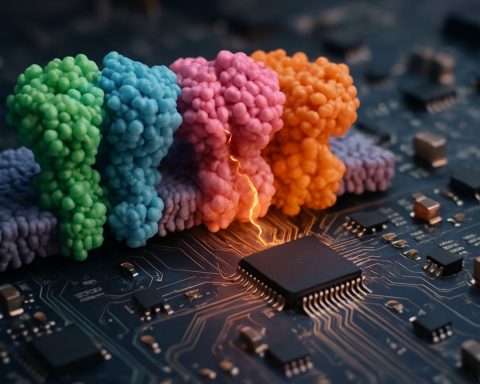Exciting new research reveals that noise, often seen as harmful in quantum mechanics, can actually bolster entanglement. This groundbreaking discovery reshapes our understanding of noise in quantum systems.
In a surprising twist, scientists found that when noise is strategically applied to a secondary system, known as an ancilla, it can enhance the entanglement of a primary quantum system. This phenomenon occurs especially when the ancilla operates with rapid internal dynamics. The noise seems to serve as a protective layer, shielding the primary system from destructive decoherence.
The implications of this research are profound for quantum computing and communication, where preserving entanglement is crucial. Traditional error correction methods are resource-intensive; however, this novel approach suggests that controlled noise could simplify protective strategies and reduce complexity.
The study utilized a model involving two coupled chains of particles, or fermions—one acting as the primary system and the other as the ancilla. By manipulating noise and interaction strength, researchers observed increased entanglement in the primary system, driven by the fast dynamics of the ancilla.
While these findings are promising, they remain in the preliminary stages and necessitate further investigation into the scalability and applicability of this technique in more complex real-world systems. Researchers are eager to explore if smaller ancillae can yield similar protective effects, potentially revolutionizing quantum technology as we know it.
The Optimistic Noise Paradigm: Rethinking Quantum Mechanics
The recent findings on noise in quantum mechanics hold significant implications for both the global economy and our cultural perspectives on technology. Noise, traditionally considered detrimental, now presents a potential catalyst for breakthroughs in quantum computing and information technology. This shift could stimulate economic growth by enabling more efficient quantum systems, paving the way for advancements in artificial intelligence, cryptography, and data security. As nations race to assert dominance in quantum technologies, the harnessing of noise could provide a critical edge in the global tech landscape.
Moreover, this research may reshape our cultural relationship with technology and nature. As we grapple with the complexities of a digital age, the notion that imperfection, or noise, can be beneficial symbolizes a paradigm shift. It challenges the tech-savvy populace to rethink the attributes of efficiency and perfection, potentially fostering a more harmonious interaction with technology.
On the environmental front, utilizing controlled noise could lead to less energy-intensive quantum processes. This could imply reduced carbon footprints associated with the massive computational demands of modern technology. If successful, the innovative use of noise might usher in a future where advanced technologies coexist with sustainable practices, aligning progress with environmental responsibility.
As investigations continue, the potential for this novel approach to simplify quantum error correction and fortify the integrity of quantum systems may prove groundbreaking, marking a pivotal moment in both scientific understanding and practical application.
Unlocking the Power of Noise: A Revolutionary Approach to Quantum Entanglement
The Paradigm Shift in Quantum Research
Recent research has flipped the conventional wisdom surrounding noise in quantum mechanics on its head. Traditionally viewed as a detrimental force, noise can actually serve as a beneficial element, enhancing entanglement in quantum systems when applied correctly through a secondary system known as an ancilla. This discovery unveils new possibilities for future advancements in quantum computing and communication, vital fields where maintaining entanglement is essential.
How Noise Boosts Entanglement
This innovative approach involves strategically introducing noise to the ancilla system, which can protect and bolster the entanglement of the primary quantum system. Interesting patterns emerged from experiments conducted with two coupled chains of fermions: manipulating noise and the interaction strength between these chains led to significant increases in entanglement within the primary system, fueled by the rapid internal dynamics of the ancilla.
Practical Implications for Quantum Technology
This breakthrough could lead to transformative changes in how quantum technologies handle errors. Current methods of quantum error correction are notoriously complex and resource-intensive. The new findings suggest that noise, when controlled effectively, could serve to simplify these strategies. By utilizing this controlled noise approach, researchers anticipate a substantial reduction in the complexity and resources needed for protecting quantum states.
Future Directions and Limitations
While the implications of this research are groundbreaking, they remain in early stages. Researchers acknowledge the need for further studies to explore the scalability of this technique across more intricate and practical quantum systems. Future research could focus on the feasibility of employing smaller ancillae and whether they could yield similar protective benefits.
Pros and Cons of Utilizing Noise in Quantum Systems
Pros:
– Enhances quantum entanglement through controlled noise.
– Offers a potential simplification of error correction methods.
– Could significantly decrease resource consumption in quantum systems.
Cons:
– Requires extensive further research and validation before real-world application.
– Current methods and insights are primarily theoretical and experimental, needing practical implementation.
Future Trends in Quantum Computing
As this field continues to evolve, the integration of noise as a tool rather than a hindrance could redefine quantum computing architectures. Innovations in this domain may lead to more robust and efficient systems capable of overcoming classical limitations. Researchers are optimistic that these developments may soon pave the way for practical, large-scale quantum applications.
Insights and Market Analysis
The quantum technology market is expanding rapidly, projected to reach billions of dollars in the coming years. With ongoing advancements in understanding quantum mechanics, including this recent noise-enhancing research, companies and institutions dedicated to quantum computing could see significant advantages in competitive landscapes. The integration of such novel techniques could determine the effectiveness and sustainability of future quantum technologies.
Conclusion
This intriguing research represents a vital step forward in quantum mechanics, shifting the narrative away from viewing noise strictly as harmful. By uncovering the potential of noise to enhance quantum entanglement, scientists open new avenues for simplifying quantum technologies. Continued investigation and innovation in this realm will be essential as we strive to harness the full power of quantum computing and communication systems.
For more insights into the latest advancements in quantum technology, visit ScienceDirect.










